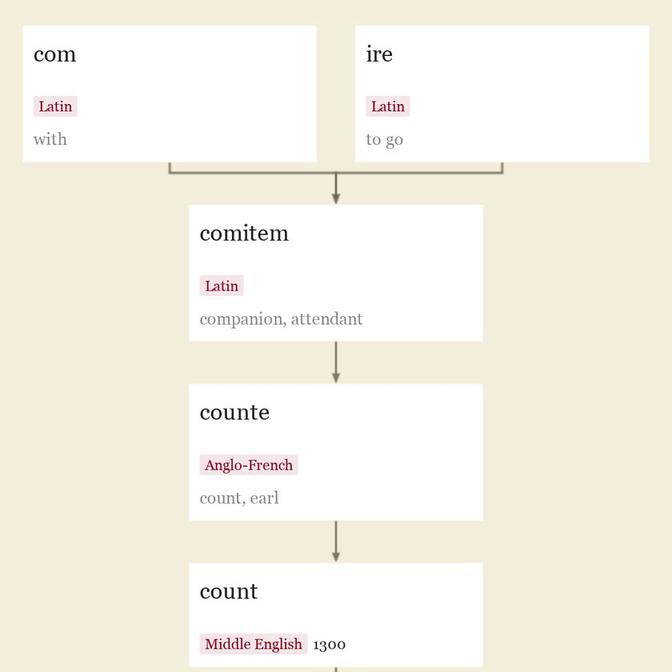viscount (n.)
14世纪晚期,“伯爵或伯爵的代表”,源自盎格鲁-法国和古法语 visconte(现代法语 vicomte),源自中世纪拉丁语 vicecomes(属格 vicecomitis),源自晚期拉丁语 vice- “代理”(见 vice-) + 拉丁语 comes “帝国法庭成员,贵族”(见 count(n.1))。作为英国贵族等级,首次记录于1440年。相关: Viscountess。
viscount 的相关词汇

在一些大陆国家中,贵族的称号,对应于英国的 earl,大约在公元1300年左右,源自盎格鲁-法语的 counte "伯爵,伯爵"(古法语 conte),源自拉丁语的 comitem(主格 comes)"同伴,随从",罗马时期对省长的称呼,源自 com "和"(参见 com-)+ ire "去"的词干(源自 PIE 词根 *ei- "去")。这个术语在盎格鲁-法语中用来翻译古英语的 eorl,但这个词从未真正被本土化,主要是用来指外国的称号。
In ancient Rome and the Roman empire, [a comes was] a companion of or attendant upon a great person; hence, the title of an adjutant to a proconsul or the like, afterward specifically of the immediate personal counselors of the emperor, and finally of many high officers, the most important of whom were the prototypes of the medieval counts. [Century Dictionary]
在古罗马和罗马帝国中,[ comes ]是伟大人物的同伴或随从; 因此,是副总督等的副官的称号,后来特指皇帝的直接个人顾问,并最终成为许多高级官员的称号,其中最重要的是中世纪伯爵的原型。[世纪词典]
这个词缀的意思是“代理,助手,替代”,也可以表示“代替,取代”,15世纪源自拉丁语 vice,“代替”, vicis 的与格形式,意为“变化,轮换,交替”(源自 PIE 词根 *weik-(2),“弯曲,蜿蜒”)。在中古英语中,有时借用了古法语形式 vis-, vi-。
原始印欧词根表示“前进”。
它构成或构成部分: Abitur ; adit ; ambience ; ambient ; ambit ; ambition ; ambitious ; andante ; anion ; cation ; circuit ; coitus ; commence ; commencement ; concomitant ; constable ; count (n.1)贵族的头衔; county ; dysprosium ; errant ; exit ; initial ; initiate ; initiation ; introit ; ion ; issue ; itinerant ; itinerary ; janitor ; January ; Janus ; Jena ; Mahayana ; obiter ; obituary ; perish ; praetor ; Praetorian ; preterite ; sedition ; sudden ; trance ; transient ; transit ; transitive ; viscount 。
梵语 e'ti “走”, imas “我们走”, ayanam “一种前进,路径”; 阿维斯陀语 ae'iti “走”,古波斯语 aitiy “走”; 希腊语 ienai “前进”; 拉丁语 ire “前进”, iter “一种道路”; 古爱尔兰语 ethaim “我去”,爱尔兰语 bothar “一条道路”(来自 *bou-itro- “牛的路”),高卢语 eimu “我们走”; 立陶宛语 eiti “前进”; 古教会斯拉夫语 iti “走”; 保加利亚语 ida “我走”; 俄语 idti “前进”; 哥特语 iddja “已经走了”。